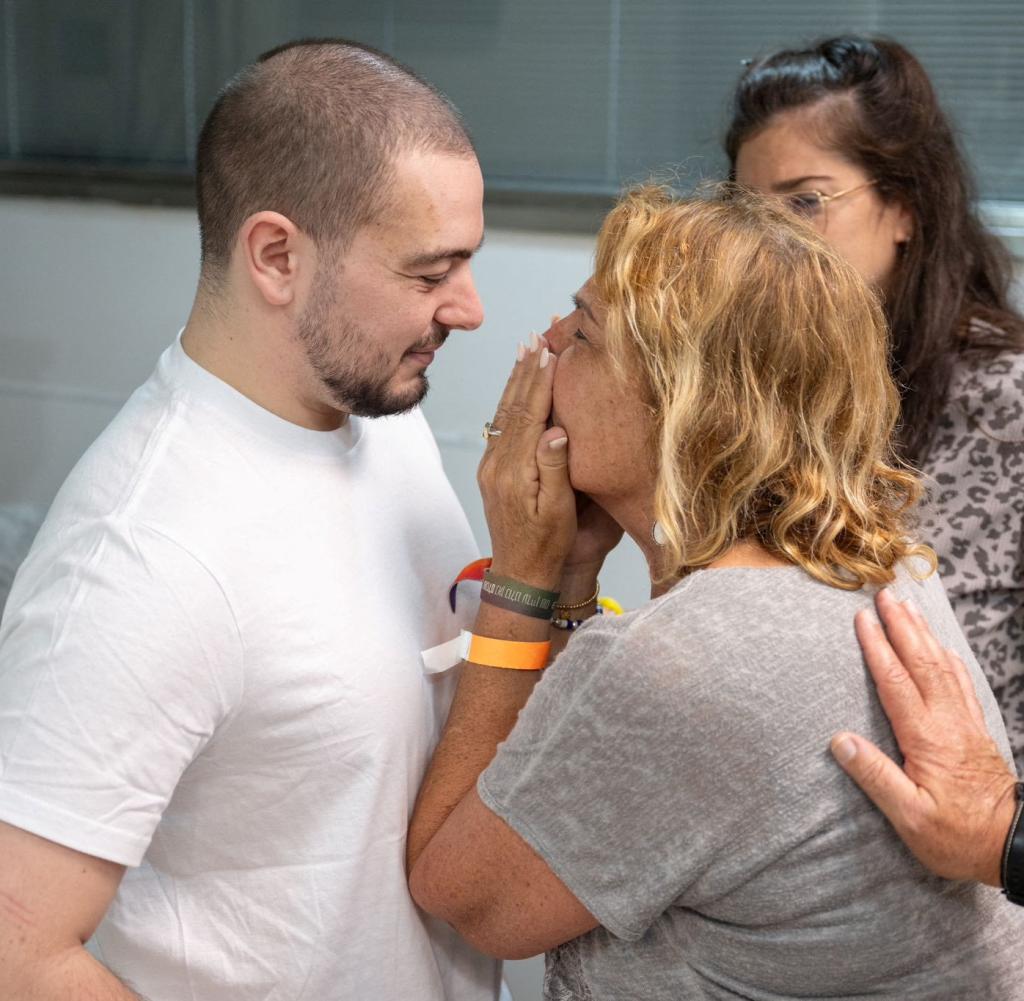Four Israeli hostages were held by Hamas terrorists for eight months before they were freed by the Israeli army in Nuseirat at the weekend. Now more details are emerging about what three of them experienced during those 246 days.
According to a report in the Wall Street Journal (WSJ), Almog Meir Jan, Shlomi Ziv and Andrey Kozlov were isolated from the outside world by their kidnappers and held in a dark room for six of the eight months. The paper cites statements from family members of the hostages, as well as from security authorities. In the dark room, they had to sleep on thin mattresses and were often mistreated. They only had contact with the outside world through the people who brought them food and beat them.
After their kidnapping on October 7 at the Nova Music Festival, the hostages were housed on the top floor of a Palestinian family’s house, whom they never met. However, the family’s children could hear them, reports Aviram Meir, Amlog Meir Jan’s uncle. When the family was not there, they were allowed to use the kitchen. Otherwise, the hostages often went hungry.
The Israeli army had previously released a video of the liberation. Heavily armed soldiers enter the house. The family’s belongings can be seen, which the soldiers run past until they break down the door to a room and speak to the completely surprised hostages. They are taken out of the building barefoot and under gunfire.
The kidnappers imposed strict rules on their victims, the WSJ reports. If the hostages violated these rules, they were punished. Among other things, the kidnappers wrapped them in thick blankets in the heat or locked them in the bathroom.
The terrorists also used psychological torture and repeatedly threatened to execute them. The hostages were also told that no one was looking after them and that they had been forgotten in Israel, the uncle continued. They often heard that no one was coming to save them.
At times, his nephew had lost all hope, Aviram Meir told the New York Post. But then he caught a brief glimpse of a television. He briefly recognized his own face on the screen because the Al-Jazeera TV station was showing a report from Israel. Relatives of hostages had held up his portrait on a poster. “At that moment, he realized that he had not been forgotten,” Aviram Meir said.
To pass the time, the three hostages played cards, learned Arabic, or taught each other Hebrew or Russian. They recorded their experiences and thoughts in diaries. The three became close friends during this time, and this solidarity helped them to survive the ordeal, it continues.
After his release, 22-year-old Almog Meir had to deal with two pieces of bad news, his uncle continued. Firstly, the loss of his father, who died on the day of his release, and the death of a friend who did not survive October 7, his uncle reported. Almog “was very upset, it was quite shocking,” said his uncle.
Previously, 26-year-old Noa Argamani, the fourth freed hostage, had already spoken about her captivity. According to her, she was held by a wealthy Palestinian family and was constantly guarded. She was moved several times and then had to disguise herself as an Arab woman. She learned Arabic from her guards and talked to them. Among other things, she was told that she was lucky to be with the family.
According to Israeli media, Argamani has now spoken to the Israeli security chief, reports Channel 12. “I tried to stay strong, but there were difficult moments. First I was with Moran Stella Yanai, and when she was released I told her, ‘See you soon.’ I never thought it would take so long,” she is quoted as saying by the Jerusalem Post. “Once I heard a report on the radio that Israel was against ending the war, and that broke me.”
On some days she heard “non-stop shelling” from the Israeli army nearby. This strengthened her and helped her “to stay strong and to practice mindfulness,” she continued. Argamani is currently in the hospital where her mother, who is suffering from cancer, is being treated.
Meanwhile, Israeli police confirmed that among the terrorists who held Argamani was a journalist who worked for the Qatar-run TV station Al Jazeera. “No press release can make him innocent of the crimes he committed,” the accompanying post said. Al Jazeera denies the allegations. A press release from the station states that the man never worked with the network, but that he “did write a commentary in 2019.”
The security authorities are said to have asked the hostages not to share too much of their experiences with the public in order not to jeopardize the release of other prisoners. There are said to be up to 120 hostages abducted from Israel still in the Gaza Strip. However, it is believed that around a third of them are no longer alive. Hostages who were released earlier had described being held in underground tunnels and being psychologically, physically and sexually abused.
The mother of one of the freed victims called on the Israeli government on Saturday to reach an agreement to release the remaining prisoners. They need “an agreement to come home safely,” said Orit Meir, mother of 22-year-old Almog Meir Jan. “There is an agreement on the table. We call on the Israeli government to push ahead with the agreement.” She also asked the international community to “continue to put pressure on Hamas to accept this agreement.”




